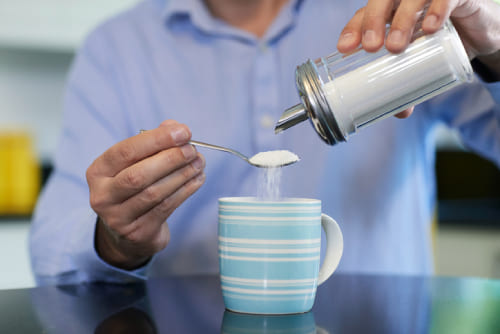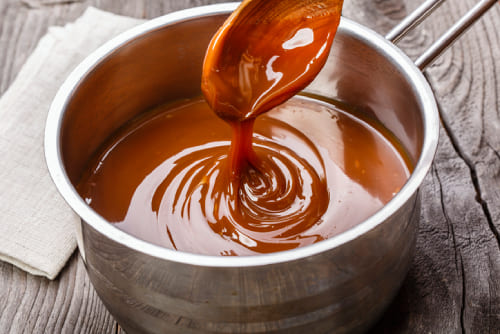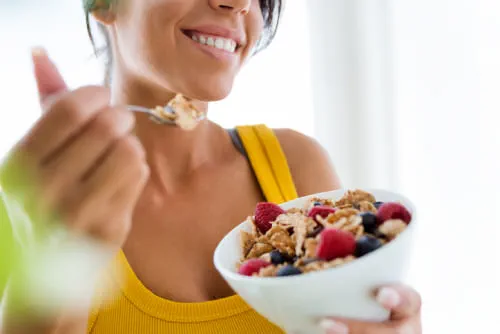Navigation
Are all sugars bad for your teeth?
We all know that sugar is bad for our teeth. But do all sugars result in cavities and tooth decay, or are certain sugars and so-called ‘natural’ sugars any less harmful?
Products and ingredients featuring ‘added sugars’ are considered the worst for your teeth. However, dental professionals will tell you that all sugars can contribute to tooth decay, and it’s important to be aware that ‘natural’ sugars should also be eaten in moderation. Simply put, there is no such thing as sugar that’s good for your teeth.

Why are sugars bad for your teeth?
Despite occurring naturally in a wide array of fruits, vegetables and other healthy foods, sugars aren’t beneficial to your oral health. The reasons for this come down to the fact that sugar feeds harmful oral bacteria. When these bacteria feed on sugar, they rapidly excrete acids which cause damage to your teeth. Furthermore, sugar helps them to multiply, creating greater quantities of bacteria which in turn produce more acid.
Often, the same bacteria end up producing plaque - a sticky film-like substance that clings to the teeth. Plaque protects the bacteria by surrounding and encasing it, further worsening the issue. It’s a vicious cycle that we should all be aware of when considering the foods we eat, and the steps we take to maintain good oral health.
When selecting the food we eat, it’s important to be aware these bacteria cannot tell the difference between artificial sugars and their ‘natural’ counterparts, as almost every type of sugar will feed oral bacteria. This includes grain sugars like glucose, your regular household sugars or sucrose, the fructose in fruit sugars and lactose in milk. It really doesn’t matter where the sugar in your diet is coming from: it can still potentially cause tooth decay and cavities to form.
Some types of carbohydrates can be broken down in sugar by oral bacteria. However, this type of sugar doesn’t produce as much energy as the others, meaning the bacteria can’t use it to reproduce quite as quickly. As such, sugars in complex carbohydrates such as grains, beans, potatoes and brown bread won’t have such a damaging effect.

Why are ‘added sugars’ so much worse?
Ingredients with natural sugars, like fruit, vegetables and dairy products are central to a healthy and balanced diet. The sugars present in these foods aren’t going to cause oral health issues when enjoyed in moderation, and when you maintain the fundamentals of good oral hygiene. When you have a good oral health routine - brushing and flossing twice a day, and visiting your dentist and hygienist - any oral bacteria present in the mouth shouldn’t result in a build-up of plaque.
It’s important to be aware, however, that foods with added sugars are generally far worse for your teeth than foods with natural sugars. This is because adding sugar to foods and ingredients increases the quantity of sugar making contact with your teeth. As a result, residue from your food will be more likely to feed oral bacteria, which causes plaque to develop.
What’s more, the sugars found in natural ingredients are generally balanced with liquids that help wash the sugar away. They’ll also be present with proteins that feed other, less harmful and beneficial bacteria, as well as fibre which encourages chewing. This in turn increases the production of saliva, which helps to flush away sugars and neutralise bacteria.
Added sugars are often highly processed and modified, making them stickier and more viscous than natural sugars. Take caramel, for example - a common ingredient in all kinds of sweet foods. Caramel is a sugar that has been processed into a polymer, making it even more likely to cling to the teeth and feed harmful oral bacteria, often up to several hours after eating or drinking. Such added sugars are also often separated from antioxidants in foods, which can help keep oral bacteria at bay.
Sometimes, foods and drinks that we consider ‘natural’ have actually been processed, and even have had sugar added to them to make them sweeter. Dried fruits and concentrated fruit juices are common culprits and should be enjoyed in moderation.

Are natural sugars any better for your teeth?
It’s not uncommon to hear that natural sugars are better for your health than other types of sugar. Honey, maple syrup, agave nectar and many other plant extracts are regularly championed as healthier alternatives. Unfortunately, there’s plenty of misinformation out there regarding just how much better they might be.
Maple syrup and agave nectar are in fact concentrates of sugar syrups, and aren’t ‘natural’ products but rather processed ingredients from natural sources. Honey is also a processed ingredient - it’s just processed by bees, rather than by humans or mechanical methods. Cheaper honey is also sometimes blended with sugar syrups before being packaged and sold.
Once again, it’s important to remember that on the whole, it really doesn’t make a difference what types of sugar you’re eating when it comes to harming your oral health - it’s more about the quantity than the quality or source. Some experts argue that sucrose (common in sweets, chocolate, sweet cereals and other sweet foods) is stickier and therefore more harmful than fructose (which you’ll find in fruits, vegetables and honey) and glucose, but the difference isn’t a particularly significant one.
Does teeth straightening help with oral health?
We often think of teeth straightening - whether with traditional metal braces or discreet transparent retainers like Invisalign - as primarily an aesthetic procedure, aimed at revealing a more confident smile.
However, it’s important to remember that straighter teeth are often healthier teeth, too. Crowded, crooked or overlapping teeth can be more difficult to clean, and often allow for a greater build-up of oral bacteria and plaque.
At Total Orthodontics, we take pride in providing an array of solutions for a straighter and healthier smile. If you're considering teeth straightening, book a free consultation to discuss your options. From clear aligners and discreet options to traditional metal braces, we’ve got the right teeth straightening solution for you.